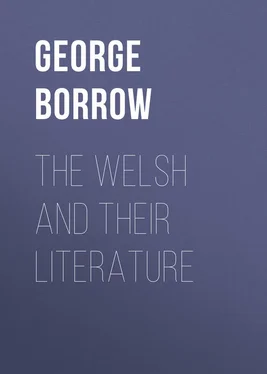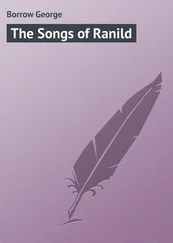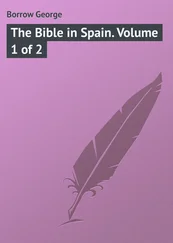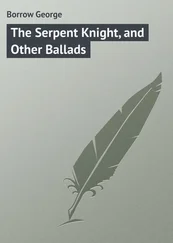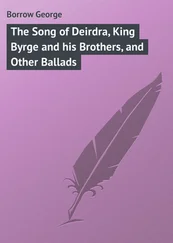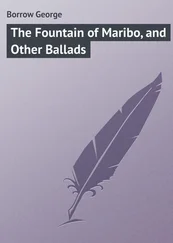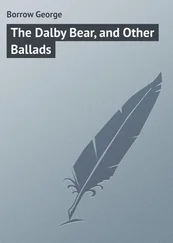George Borrow - The Welsh and Their Literature
Здесь есть возможность читать онлайн «George Borrow - The Welsh and Their Literature» — ознакомительный отрывок электронной книги совершенно бесплатно, а после прочтения отрывка купить полную версию. В некоторых случаях можно слушать аудио, скачать через торрент в формате fb2 и присутствует краткое содержание. ISBN: , Жанр: foreign_prose, на английском языке. Описание произведения, (предисловие) а так же отзывы посетителей доступны на портале библиотеки ЛибКат.
- Название:The Welsh and Their Literature
- Автор:
- Жанр:
- Год:неизвестен
- ISBN:http://www.gutenberg.org/ebooks/33336
- Рейтинг книги:3 / 5. Голосов: 1
-
Избранное:Добавить в избранное
- Отзывы:
-
Ваша оценка:
- 60
- 1
- 2
- 3
- 4
- 5
The Welsh and Their Literature: краткое содержание, описание и аннотация
Предлагаем к чтению аннотацию, описание, краткое содержание или предисловие (зависит от того, что написал сам автор книги «The Welsh and Their Literature»). Если вы не нашли необходимую информацию о книге — напишите в комментариях, мы постараемся отыскать её.
The Welsh and Their Literature — читать онлайн ознакомительный отрывок
Ниже представлен текст книги, разбитый по страницам. Система сохранения места последней прочитанной страницы, позволяет с удобством читать онлайн бесплатно книгу «The Welsh and Their Literature», без необходимости каждый раз заново искать на чём Вы остановились. Поставьте закладку, и сможете в любой момент перейти на страницу, на которой закончили чтение.
Интервал:
Закладка:
‘Let lovely lilacs line Lee’s lonely lane!’
in which not only every word, but every syllable commences with the same letter — l .
But what is this English alliterative triumph of the young lady compared with the Welsh alliterative triumph of Dafydd Nanmawr, who wrote a poem of twelve lines, every syllable of which commences with the letter g, with the exception of the last, which begins with n?
The earliest Cymric or British metre seems to have been a triban or triplet, in each line of which there were in general six syllables. The bards of the sixth, seventh, and several succeeding centuries used this metre, and likewise others, invented by themselves, in which the lines are of various length. There was no regular system of prosody till the year 1120, when one was established under the auspices of Grufydd ap Cynan, prince of Gwynedd. This Ap Cynan, who, though of Welsh origin, was born in Dublin, and educated at the Danish Irish court, was passionately fond of poetry, and was not only well acquainted with that of the British bards, but with the strains of the Icelandic skalds and Irish fileas. Shortly after his accession to the throne of Gwynedd, of which he was the rightful heir, he proclaimed an eisteddfod, or poetical sessions. At this eisteddfod, which was numerously attended by poets of various nations, a system of prosody was drawn up by competent persons, at his instigation, for the use of the Welsh, and established by his authority. This system, in which Cymric, Icelandic, and Irish forms of verse are blended and amalgamated, has with a few unimportant variations maintained its ground to the present time. It contains three primary measures, termed respectively, englyn, cywydd, and awdl. Of the englyn, there are five kinds; of the cywydd, four; and of the awdl, fifteen. Each particular species of englyn, cywydd, and awdl has its appropriate name, which it is needless to give here. These three primary metres, with their modifications, make together twenty-four measures, which embrace the whole system of Welsh versification, in which, as somebody has observed, each line, word, and letter, are so harmonized by consonancy, chained so accurately, woven so closely and correctly, that it is impossible to extract one word or even letter without causing a hideous gap. Whoever has ventured to compose out of these measures, since the time of their establishment, has been considered by the Welsh scholar as unworthy of the name of poet.
The earliest recorded poet of the Cymry, after the days of Gwyddon Ganhebon and the other personages mentioned with him in the triad, is Merddin, Beirdd Emrys Wledig, or Merddin, Bard of Prince Emrys. He flourished about the middle of the fifth century, the period when the Saxons arrived in Britain, under the command of Hengist and Horsa. Besides poetry he was skilled in mathematics, and is said by the Welsh to have been the architect of Stonehenge. He has been surnamed Ambrosius, which is the Latin modification of the name of his patron Emrys. He is the Merddin, or Merlin, who has had to father so many of the prophecies which since his death have been produced. None of his poems are extant.
Конец ознакомительного фрагмента.
Текст предоставлен ООО «ЛитРес».
Прочитайте эту книгу целиком, купив полную легальную версию на ЛитРес.
Безопасно оплатить книгу можно банковской картой Visa, MasterCard, Maestro, со счета мобильного телефона, с платежного терминала, в салоне МТС или Связной, через PayPal, WebMoney, Яндекс.Деньги, QIWI Кошелек, бонусными картами или другим удобным Вам способом.
1
It is but right to state that the learned are divided with respect to the meaning of ‘Cumro,’ and that many believe it to denote an original inhabitant .
2
Yehen banog: humped or bunched oxen, probably buffaloes. Banog is derived from ban – a prominence, protuberance, or peak.
3
Above we have given what we believe to be a plain and fair history of Hu Gadarn; but it is necessary to state, that after his death he was deified, and was confounded with the Creator, the vivifying power and the sun, and mixed up with all kinds of myths and legends. Many of the professedly Christian Welsh bards when speaking of the Deity have called Him Hu, and ascribed to the Creator the actions of the creature. Their doing so, however, can cause us but little surprise when we reflect that the bards down to a very late period cherished a great many druidical and heathen notions, and frequently comported themselves in a manner more becoming heathens than Christian men. Of the confounding of what is heavenly with what is earthly we have a remarkable instance in the ode of Iolo Goch to the ploughman, four lines of which, slightly modified, we have given above. In that ode the ploughman is confounded with the Eternal, and the plough with the rainbow: —
‘The Mighty Hu who reigns for ever,
Of mead and song to men the giver,
The emperor of land and sea
And of all things which living be,
Did hold a plough with his good hand,
Soon as the deluge left the land,
To show to men, both strong and weak,
The haughty hearted and the meek,
There is no trade the heaven below
So noble as to guide the plough.’
To the Deity under the name of Hu there are some lines by one Rhys, a Welsh bard of the time of Queen Elizabeth, though they are perhaps more applicable to the Universal Pan or Nature than to the God of the Christians: —
‘If with small things we Hu compare,
No smaller thing than Hu is there,
Yet greatest of the great is He,
Our Lord, our God of Mystery;
How swift he moves! a lucid ray,
A sunbeam wafts him on his way;
He’s great on land, and great on ocean,
Of one more great I have no notion;
I dread lest I should underrate
This being, infinitely great.’
4
The poetical translations in this notice are taken from Borrow’s ‘Songs of Europe.’
Интервал:
Закладка:
Похожие книги на «The Welsh and Their Literature»
Представляем Вашему вниманию похожие книги на «The Welsh and Their Literature» списком для выбора. Мы отобрали схожую по названию и смыслу литературу в надежде предоставить читателям больше вариантов отыскать новые, интересные, ещё непрочитанные произведения.
Обсуждение, отзывы о книге «The Welsh and Their Literature» и просто собственные мнения читателей. Оставьте ваши комментарии, напишите, что Вы думаете о произведении, его смысле или главных героях. Укажите что конкретно понравилось, а что нет, и почему Вы так считаете.
